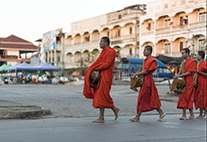Buddhist Perspectives on Food and DrinkIssues from Ethics, Soteriology, and Cultural History
4 July 2016

Photo:
A wandering monk was climbing a mountain alongside a stream, on his way to the Zen monastery at the top, when he noticed a vegetable leaf floating downstream. He thought, "It is just a single leaf, but any place that would waste it cannot be very good," and he turned to go back down the mountain. Just then he saw a lone monk come running down the path, chasing after the floating leaf. Immediately the wandering monk decided to enroll in the monastery at the top of the mountain.
(Kenneth Kraft. Eloquent Zen: Daitō and Early Japanese Zen. Honolulu 1992, p. 83.)
To deal with food in a conscious and careful manner is of tantamount importance to the good life in the Buddhist view of things. As do other religions, Buddhism holds that to eat and to drink means more than to merely nourish and sustain bodily existence. Rather, spiritual, soteriological, and social dimensions are ascribed to food and drink, and these perform essential roles within the religious system of meaning. Some few examples from the history of Buddhism may suffice as
The Numata Center for Buddhist Studies’ lecture series “Buddhist Perspectives on Food and Drink. Issues from Ethics, Soteriology, and Cultural History” during the summer semester of 2016 will discuss Buddhist conceptions of food and drink with respect to the tension, among others, between social norms and the individual quest for salvation, normative
All lectures are held on Mondays, 6 to 8 pm in room 221 at the Asien-Afrika-Institut, Edmund-Siemers-Allee 1, East Wing.
18.04.2016
Fleischverzehr und Vegetarismus
Prof. em. Dr. Lambert Schmithausen (Hamburg)
06.06.2016
The Consumption of Forbidden Food in Chinese Buddhism
Prof. Dr. Ann Heirman (Ghent)
27.06.2016
Consuming Japaneseness in the Tea Room. Between the Ordinary and Extra-Ordinary
Prof. Kristin Surak,
Please note: The venue has changed to room no. 221, WEST WING!
04.07.2016
Tötungsverbot und Fleischgenuss in Japan
Prof. Dr. Klaus Vollmer (Munich)
The lectures will be given in English or German. Admission is free. All interested parties are welcome!
Flyer (PDF)
Coordination: Prof. Dr. Steffen Döll (Numata Center for Buddhist Studies, Universität Hamburg)